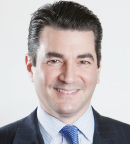
ON AUGUST 30, 2017, the U.S. Food and Drug Administration (FDA) approved tisagenlecleucel (Kymriah) for pediatric and young adult patients up to 25 years with B-cell precursor acute lymphoblastic leukemia (ALL) that is refractory to initial treatment or in second or later relapse. Tisagenlecleucel is a genetically modified autologous T-cell immunotherapy.
On the same day, the FDA also expanded the approval of tocilizumab (Actemra) to treat CAR T-cell–induced severe or life-threatening cytokine-release syndrome in patients 2 years of age or older.

Scott Gottlieb, MD
‘A New Frontier’
“WE’RE ENTERING A NEW FRONTIER in medical innovation with the ability to reprogram a patient’s own cells to attack a deadly cancer,” said FDA Commissioner Scott Gottlieb, MD. “New technologies such as gene and cell therapies hold out the potential to transform medicine and create an inflection point in our ability to treat and even cure many intractable illnesses.”
Each dose of tisagenlecleucel is a customized treatment created using an individual patient’s own T cells. The patient’s T cells are collected and sent to a manufacturing center, where they are genetically modified to include a new gene that contains a chimeric antigen receptor (CAR) protein. Once the cells are modified, they are infused back into the patient, where the genetically modified CAR T cells are able to target and kill leukemia cells that have a CD19 antigen on the surface.
The FDA had granted tisagenlecleucel Priority Review and Breakthrough Therapy designations. The application was reviewed using a coordinated, cross-agency approach. The clinical review was coordinated by the FDA’s Oncology Center of Excellence, while the agency’s Center for Biologics Evaluation and Research conducted all other aspects of review and made the final product approval determination.
OF NOTE
- For more on the ELIANA clinical trial, visit ClinicalTrials.gov (identifier NCT02435849).
- Novartis, maker of tisagenlecleucel, said it is collaborating with the Centers for Medicare and Medicaid Services on an outcomes-based pricing strategy. The company noted that the cost for the one-time infusion will be $475,000.
Safety and Efficacy
THE SAFETY AND EFFICACY of tisagenlecleucel were demonstrated in the phase II multicenter ELIANA clinical trial involving 63 pediatric and young adult patients with relapsed or refractory B-cell precursor ALL. The overall remission rate within 3 months of treatment was 83%.
Treatment with tisagenlecleucel has the potential to cause severe side effects. It carries a boxed warning for cytokine-release syndrome—which is a systemic response to the activation and proliferation of CAR T cells causing high fever and flu-like symptoms—and for neurologic events. Both cytokine-release syndrome and neurologic events can be life-threatening. Other severe side effects of tisagenlecleucel include serious infections, hypotension, acute kidney injury, fever, and hypoxia.
Risk Evaluation and Mitigation Strategy
BECAUSE OF THE RISK of cytokine-release syndrome and neurologic events, tisagenlecleucel is being approved with a risk evaluation and mitigation strategy, which includes elements to ensure safe use. The FDA is requiring that hospitals and their associated clinics that dispense tisagenlecleucel be specially certified. As part of that certification, staff involved in the prescribing, dispensing, or administering of tisagenlecleucel are required to be trained to recognize and manage cytokine-release syndrome and neurologic events.
Additionally, the certified health-care settings are required to have protocols in place to ensure that tisagenlecleucel is only given to patients after verifying that tocilizumab is available for immediate administration. ■


